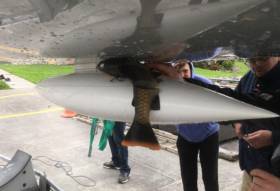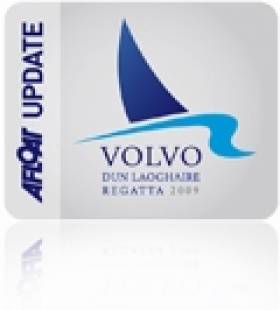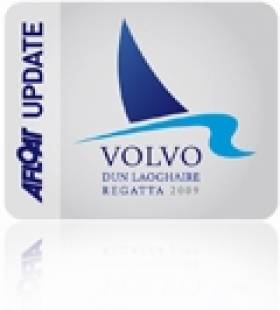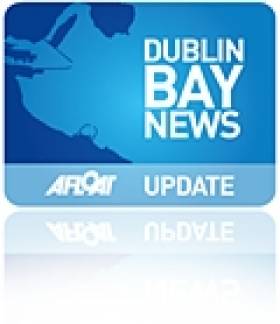Displaying items by tag: Adam Winkelmann
There were no final races today at the Dragon European Championships meaning last night's results stand leaving Pedro Rebeo De Andrade, Ireland's Adam Winkelmann and Jorge Pinheiro De Melo in second overall.
The fleet was held ashore for most of the day as the easterly winds were very fickle all morning. They only went afloat at 1.30 as the RO attempted one start before the 3 pm cut off time.
However, as the Dragons arrived at the race course the wind shifted 180 degrees as the strong gale force Mistral winds arrived from the west bringing 3/4 metre waves.
The Race Officer abandoned any attempts to start a race and sent the fleet ashore for the last time.
A win for Adam Winkelmann, of the National and Royal Irish Yacht Clubs, puts him in second overall and two points off the overall lead at the Dragon European Championships in San Remo, Italy after five races sailed.
As Afloat previously reported, Winkelmann is on the crew of the Portuguese entry Petti Portugal with reigning Dragon European and Gold Cup Champion Pedro Andrade at the helm.
Swiss entry Quick1 sailed by Wolf Waschkuhn, Charles Nankin and Ruairidh Scott continue his overall lead by two points after discard and with two races left to sail for The Virginie Heriot Cup.
In Thursday's race five, the Portuguese/Irish entry was second to the top mark with Washkin struggling mid-fleet. Andrade managed to get to first on the second beat and Washkin got back to seventh by the finish.
There is a question mark tonight over the rest of the championship due to the forecasted arrival of a storm on Friday.
The current plan is to go out early for two final races in San Remo, weather permitting.
Download results below
Dun Laoghaire's Adam Winkelmann Joins Portuguese Crew for Dragon European Championships Defence
The Dragon European Championships kick off in San Remo, Italy on Monday next.
Irish interest in the three-man keelboat competition will be with Adam Winkelmann, National and Royal Irish Yacht Clubs, who joins the crew of the Portuguese entry Petti Portugal with reigning Dragon European & Gold Cup Champion Pedro Andrade at the helm.
Pedro is also the new owner of Petticrows, the largest builder of Dragons in Europe and they are sailing one of the earliest new boats from their production line in Portugal (moved from Burnham on Crouch in the UK).
Both Pedro and Adam are regular crew with Martin Byrne and John Simms onboard Jaguar Sailing Team from Royal St George Yacht Club, who are based in Europe, but not competing at this regatta.
The Dragon European Championship racing continues until Friday,
Something Fishy On Wag Pair’s Keel At Lough Ree This Past Weekend
Peter Kennedy made waves on Lough Ree when the current SB20 national champion took the Helmsman’s Cup at the weekend.
However, a special mention must go to Water Wag pair Guy Kilroy and Adam Winkelmann for their ‘catch of the day’ as they discovered an unusual and large fishing lure caught on their keel.
The extra weight and drag, however small, surely didn’t help their campaign at the All Ireland Sailing Championships — but perhaps it also means a good omen for next year’s event?
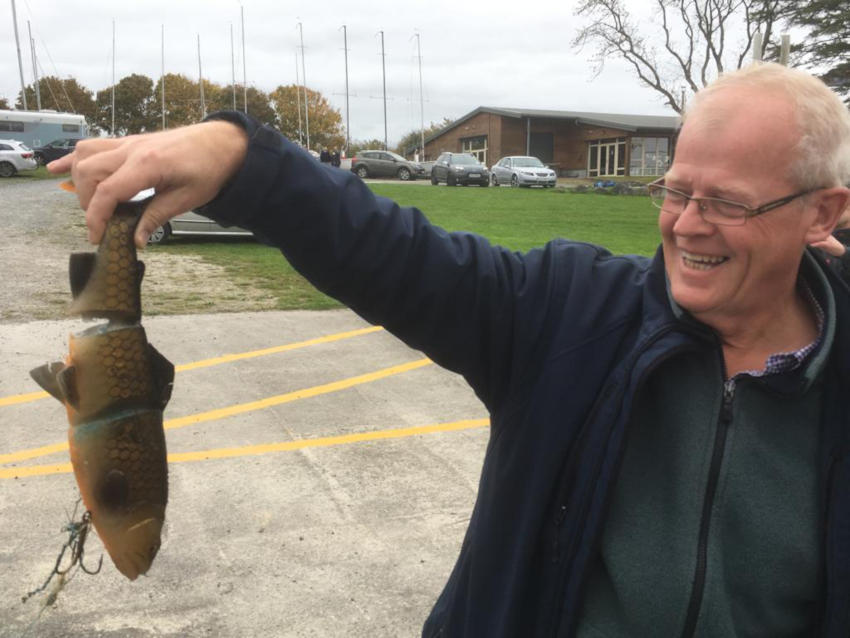
First entries in for Volvo Dun Laoghaire Regatta
July's Volvo Dun Laoghaire regatta has taken in 22 entries six months ahead of the first race. It's an encouraging figure that's on a par with the 2009 VDLR, the biggest regatta in Irish sailing that year.
The positive early response is an indication, says organiser Adam Winkelmann, that the 2011 fleet, should be a bumper one too when it sets sail on July 7th for the four day event.
The emphasis is again on providing quality racing over different courses each day but organisers are also aiming to live up up to the regatta's pre-event billing as a 'Mega Party'.
The event has opened a new website, a new Facebook page (with afloat.ie, so if you're a Facebook user please show your support and 'like it'). The regatta site is also featuring the youtube clip below of events on the bay two years ago.
So far entries received are spread across nine separate classes but it's a visiting Wayfarer fleet with eight boats named already that is setting the pace. The organisers are expecting up to 50 of the two man classic design for the class National Championships that's being staged as part of the regatta.
The notice of race (NOR) was published online in October and highlighted a reduced entry fee for 'earlybird entries'. Click HERE. or scroll down to download it as a PDF. If you participated in 2009 and entered online, this year you only need to enter your email address.
Three boats are entered in the non spinnaker class and another three in the Squib keelboat. Two entries have been received in both IRC 2 and 3.
It's still too early for a table of bands to be decided but the organisers intend to give some indication of handicap break-ups as the entries build. The IRC bands will be in line with those laid down by the Irish Cruiser Racing Association.
Despite the fact the regatta's strength since 2007 is that it draws on the capital's own fleet of 400 boats it is in fact visitors from elsewhere on the east coast that are first in. East Down Yacht Club, for example, has four entries.
But locals are signing up too. Single entries have been received in the Mermaid, Beneteau 31.7, Dragon and IRC Zero classes.
Course areas are likely to stay the same according to principal Race officer con Muphy of the National YC. Th race team is Alan Crosbie - KYC, Peter Crowley - RCYC,
David Lovegrove - HYC, Harry Gallagher - HYC, Henry Leonard - RIYC, Jack Roy - RIYC and Con Murphy - NYC. Mike Butterfield will head up the jury.
The organisers are on the look out for volunteers to assist in the run up to and during the country's biggest sailing event. In 2009 over 300 helped to make it the biggest participant sport event in the country after the city marathon, with over 3,500 sailors afloat. More details from Ciara in the event office HERE.
That's the Spirit, Dun Laoghaire Regatta Signs up Volvo!
The Dun Laoghaire Regatta team has announced its long term sponsor Volvo will continue their long association with the regatta.
Volvo Car Ireland will sponsor the 2011 event in association with Spirit Motor Group, a dealership for Volvo in South Dublin.
"Sailing is a global platform for Volvo with our global involvement in the sport including the Volvo Ocean Race and we are proud to continue our association with this superb inshore regatta organised by the 4 waterfront yacht clubs in Dun Laoghaire" commented David Baddeley, Managing Director Volvo Car Ireland.
Given the challenging economic environment this announcement illustrates the confidence of Volvo Car Ireland in the ongoing recovery in the Irish economy and the belief in the regatta as a marketing platform for the brand.
"Spirit Motor Group are delighted to work with Volvo Car Ireland and the Dun Laoghaire Regatta Committee to ensure a winning partnership for customers and the important sailing community that participate in the event" commented Alan Moore, Dealer Principal, Spirit Motor Group.
Adam Winkelmann, Chairman of the 2011 Volvo Dun Laoghaire Regatta Committee added "like all events we rely enormously on the support of our sponsors to run the event. The regatta relies heavily on sponsorship and an army of volunteers to deliver a quality event at an affordable price. We are really delighted that Volvo Car Ireland, our long-standing title sponsor, continues as our primary brand partner in that regard. We welcome Spirit Motor Group as a new and very important addition to the mix."
The biennial Volvo Dun Laoghaire Regatta will attract in the region of 500 boats and 3,000 participants along with families and friends to Dun Laoghaire in July next year. The sailors come mainly from Ireland and the UK from where we expect at least the same number of visitors as 2009. The event promises an important boost to the local economy of Dun Laoghaire town in the middle of the summer season. The regatta prides itself in delivering quality racing along with a wonderful festive atmosphere across the Dun Laoghaire waterfront.
This announcement is timed to coincide with the launch of the 2011 Volvo Dun Laoghaire Regatta official Notice of Race and Online Entry which is now available on www.dlregatta.org
Four Championships (and a Mega Party) Planned for Dun Laoghaire 2011
A number of classes have already committed to run open championships within the regatta including the Wayfarer UK and Irish Nationals, the J109 Open Championship, the SB3 Open Championship and a return match of the Irish Sea Championship in J80s between Ireland and Wales. The race management team headed up by Con Murphy, aided by the usual ocean of wonderful volunteers, are working to facilitate this to ensure the kind of quality race management and organisation that will ensure the success of these championships.
The non-spinnaker fleet was the largest fleet in the Regatta in 2009 and is expected again to top the numbers and provide great racing for large boats with a smaller crew.
The regatta combines the wonderful waterfront facilities of all 4 Dun Laoghaire clubs and includes support from other clubs in the Dublin area including Howth. There will be a full on entertainment programme for all participants and many more with the continued support of many of the sponsors of 2009 which included Volvo Cars, Dublin Port, Dun Laoghaire Rathdown County Council, The Royal Marine Hotel, Helly Hansen, Dubarry and many more.
One of the highlights of the regatta are the Ladies Lunches which will again be held across a number of the clubs on the Saturday. Top Fashion, great food, a dash of style accompanies by the glass of champagne are the order of the day. All these at a very reasonable price reflecting the realities of today's tightened purse strings.
There will be more announcements in the coming weeks.
For more information visit www.dlregatta.org or event secretary Ciara Dowling at [email protected]


























